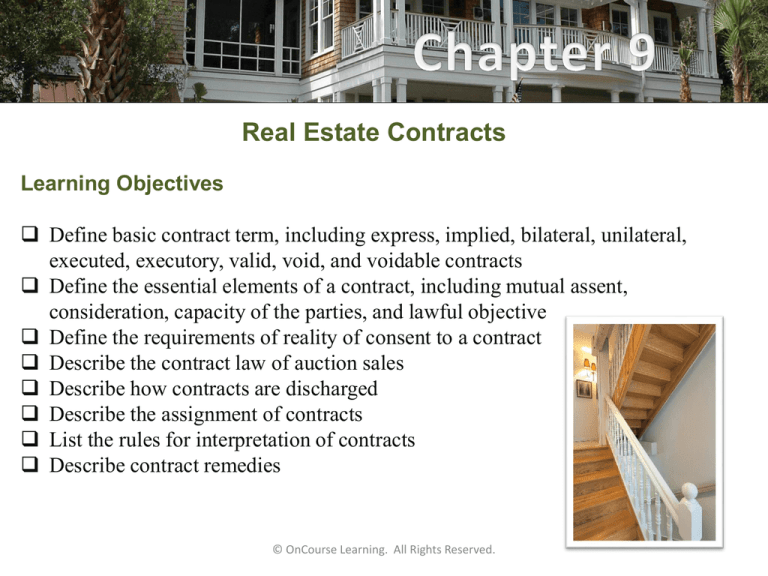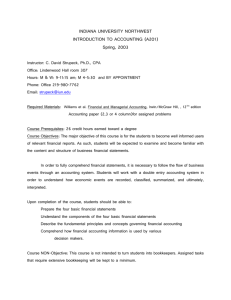
Real Estate Contracts
Learning Objectives
Define basic contract term, including express, implied, bilateral, unilateral,
executed, executory, valid, void, and voidable contracts
Define the essential elements of a contract, including mutual assent,
consideration, capacity of the parties, and lawful objective
Define the requirements of reality of consent to a contract
Describe the contract law of auction sales
Describe how contracts are discharged
Describe the assignment of contracts
List the rules for interpretation of contracts
Describe contract remedies
© OnCourse Learning. All Rights Reserved.
Real Estate Contracts
Basic Contract Law – Terms and Classifications
Express Contracts:
• An agreement in which the parties have definitely expressed all of the terms
and conditions as agreed upon between them
• Express contracts are usually written but can be oral
Implied Contracts:
• An agreement that is implied from the conduct and actions of the parties
Bilateral & Unilateral Contracts:
• Bilateral contracts are based on mutual exchange of promises or acts
between the parties
• Unilateral contracts are when one party makes a promise to the other and
the second party returns an action in response to the promise
© OnCourse Learning. All Rights Reserved.
Real Estate Contracts
Basic Contract Law – Terms and Classifications
Executed & Executory Contracts:
• Executed contracts are those which are fully performed
• Executory contracts have not been fully performed
Valid Contracts:
• A contract that is binding and enforceable
Voidable Contracts:
• Results from a failure to meet some legal requirement in negotiating the
agreement
• Can be fulfilled
Void Contracts:
• A contract that is absolutely unenforceable and has no legal force or effect,
such as a contract to perform an unlawful act
© OnCourse Learning. All Rights Reserved.
Real Estate Contracts
Basic Contract Law – Essential Elements of a Valid Contract
Mutual Assent:
• Parties must enter into the contract voluntarily
• Parties must be in mutual assent to the terms and conditions in the contract
Offer & Acceptance:
• Each contract must contain an offer and an unconditional acceptance of the
offer
• Offeror – the party making the offer
• Offeree – the party to whom the offer is being made
• Acceptance must be absolutely identical with the terms of the offer
Counteroffer:
• Rejection coupled with a new offer
• A counteroffer reverses the roles of the offeror and offeree
© OnCourse Learning. All Rights Reserved.
Real Estate Contracts
Basic Contract Law – Essential Elements of a Valid Contract
Termination of Offers can be achieved by the:
• Expiration of a time limit specified by the offeror prior to acceptance
• Death or insanity of the offeror or the offeree prior to acceptance
• Revocation of the offer by the offeror prior to acceptance
• Expiration of a “reasonable” period of time after the offer is made
and prior to acceptance
• Failure of the offeree to comply with the terms of the offer as to the
specific manner in which the acceptance must be communicated
• Expiration of a power of attorney when the offeror or the offeree is
acting as attorney-in-fact under a power of attorney
• Acceptance of the offer by the offeree
© OnCourse Learning. All Rights Reserved.
Real Estate Contracts
Basic Contract Law – Essential Elements of a Valid Contract
Consideration:
• Must be present in every contract to ensure validity and enforceability of
contract
• Consideration is anything of value (bilateral) or may consist of a promise in
return for the performance of a specified act (unilateral)
• The amount of consideration is not relevant
• Is not the same as earnest money
Capacity of the Parties:
• Each party must have contractual capacity
• Must be legally competent to contract
• Not mentally incompetent
• Not a minor
© OnCourse Learning. All Rights Reserved.
Real Estate Contracts
Basic Contract Law – Essential Elements of a Valid Contract
Lawful Objective:
• The contract must be for a legal purpose
• A contract for an illegal purpose is void
© OnCourse Learning. All Rights Reserved.
Real Estate Contracts
Basic Contract Law – Requirement of Reality of Consent
Mutual Mistake:
• Both parties must mistaken as to the same fact
• A mistake of material fact may constitute grounds to rescind a contract
• Does not cover a misunderstanding of the law by one party or the other
• Not the same legal affect as a unilateral mistake
Unilateral mistake – mistake made by one, but not both, parties
Willful Misrepresentation/Fraud:
• If a party enters a contract because of fraud, the defrauded party can rescind
the contract
Negligent Misrepresentation:
• A contracting party who has entered a contract in reliance upon a negligent
misrepresentation of a material fact is legally entitled to rescind the
contract.
Innocent Misrepresentation:
• Unintentional misstatement where the party could not “reasonably have
known”
© OnCourse Learning. All Rights Reserved.
Real Estate Contracts
Basic Contract Law – Requirement of Reality of Consent
Unfair and Deceptive Trade Practices (North Carolina General Statute):
• Can invalidate a contract if a seller or his/her agent violates it
• Proving fraud is not required
• Liability for violations could be up to three times the loss incurred by the
aggrieved party
Duress:
• Threat or fear in the negotiation of a contract
• Renders the contract voidable
• Allows threatened person to escape the contract if he/she takes positive
action to do so
Undue Influence:
• Any improper or wrongful influence by one person over another person
which prevents the other person from acting of his own free will
© OnCourse Learning. All Rights Reserved.
Real Estate Contracts
Basic Contract Law
Contract Law and Auction Sales:
• The auctioneer differs from the typical real estate agent in that the
auctioneer can bind the seller to the transaction. Two types of auctions are
those “With Reserve” and those “Without Reserve”:
• In “With Reserve” auctions the seller reserves the right to halt the
bidding if the results do not appear to be satisfactory to his/her terms.
The seller must halt the bidding before the auctioneer indicates
acceptance of a bid; thereby binding the seller to accept the bid.
• In “Without Reserve” auctions the seller holds no reservations and has
indicated that he/she accepts whatever bids are obtained.
© OnCourse Learning. All Rights Reserved.
Real Estate Contracts
Basic Contract Law
Performance Dates and Times:
• Dates and times are interpreted as “within a reasonable period of time” as
opposed to being strict
• If parties wish to have date/time strictly interpreted they should insert the
phrase “time is of the essence”
Statute of Frauds:
• An oral contract is just as valid and enforceable as a written contract
• Oral contracts often lead to misunderstandings of the rights and
obligations of the parties
• Oral contracts may be extremely difficult to prove in court should that
become necessary
© OnCourse Learning. All Rights Reserved.
Real Estate Contracts
Basic Contract Law
Statute of Frauds:
• Contracts involving the creation or conveyance of interest in real property
• Must be in writing
• Must contain all of the essential elements required for contract
validity.
• Examples include:
• Contracts to buy, sell, or exchange real estate
• Options
• Land contracts
• Lease contracts with a period of more than three years
© OnCourse Learning. All Rights Reserved.
Real Estate Contracts
Basic Contract Law
Uniform Electronic Transaction Act (UETA)
• Allows contracts to be created by electronic means and
recognizes electronic signatures are binding
• Covered in more detail in Chapter 10
© OnCourse Learning. All Rights Reserved.
Real Estate Contracts
Discharge of Contracts
Agreement of the Parties
• Accord and Satisfaction:
• New agreement between the parties
• Compromise that replaces the original contract
• If the buyer defaults on the contract, the seller can agree to accept
some other consideration as a substitute
• If the amount and/or type of the consideration is spelled out in the
original contract, it is called liquidated damages
© OnCourse Learning. All Rights Reserved.
Real Estate Contracts
Discharge of Contracts
Agreement of the Parties
• Novation:
• Substitution of a new contract for a prior contract
• Two ways to create a novation:
• The parties to the original contract may be changed
• The parties may change the terms and void the old contract
• Subsequent Modifying Agreement
© OnCourse Learning. All Rights Reserved.
Real Estate Contracts
Discharge of Contracts
Full Performance:
• All of the terms of the contract have been fully performed by all parties
Impossibility of Performance:
• Performance is specific to contractor and cannot be performed by another
• When performance of a contractual obligation becomes illegal as a result of
a change in law after the contract was created
Operation of Law:
• When the rights and/or liabilities of parties may be changed by the
application of law without the cooperation of the parties affected
• Examples:
• The Statute of Limitations
• Bankruptcy
© OnCourse Learning. All Rights Reserved.
Real Estate Contracts
Discharge of Contracts
Assignment of Contracts:
• Assignable provided no prohibition against assignment is
spelled out in the contract itself
• Refers to the transfer of legal rights and obligations by one
party to another
• Does not relieve the assignor of the of the responsibility for
performance in the event the assignee fails to perform
© OnCourse Learning. All Rights Reserved.
Real Estate Contracts
Discharge of Contracts
Rules for Interpretation of Contracts:
• The Parol Evidence Rule:
• Assumes that the written words reflect the entire agreement
• States that oral statements that do not agree with the written
words in the document are to be disregarded
• Contracts are assumed to be reasonable versus unreasonable
• Words are construed to have their ordinary meaning or sense in
place of any unusual meaning
• If there is ambiguity about the meaning of the document, the burden
will fall on the person who drafted the document, usually an
attorney
• Handwritten words always take precedence over printed words
© OnCourse Learning. All Rights Reserved.
Real Estate Contracts
Contract Remedies
Money Damages:
• The injured party is entitled to receive compensation for any
financial loss caused by the breach as may be awarded by a
court
• Money damages awarded by the court are called compensatory
damages unless they are spelled out in the contract (known as
liquidated damages)
• The court can award punitive damages if the breach of contract
was willful, malicious, and committed intentionally to do harm
Specific Performance:
• If monetary damages cannot substitute for the unique value of
land in a given location, the prospective purchaser may insist
on title to the property in place of any other remedy
© OnCourse Learning. All Rights Reserved.
Real Estate Contracts
Contract Remedies
Rescission:
• The injured party may rescind the contract, rendering it null
and void and returning buyer and seller to their original
positions
• Buyer might request this remedy if the property proves to be
different from what was represented
• Examples:
• The size of a home
• The number of acres in a tract of land
• Zoning classification
© OnCourse Learning. All Rights Reserved.








